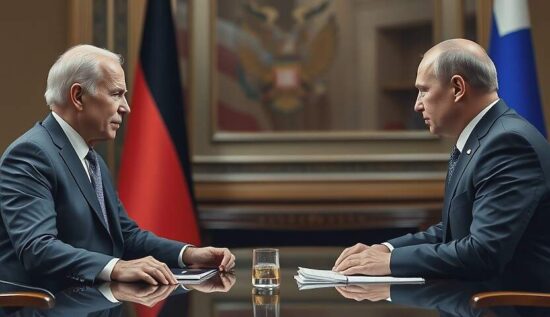US President Joe Biden draws a positive balance of his presidency. On January 13, he spoke at the US State Department about the great successes of his foreign policy. Of course, this sounds paradoxical. Biden announced, among other things:
“It will give us new challenges in the coming months and years, but it’s clear that my government will give the next president very good cards. The United States have more friends and stronger alliances. Our enemies are weakened and remain under pressure – and we haven’t even fought a war. The US is leading again, bringing countries together, shaping the agenda, and consolidating everything around our plans and goals.”
Reality looks different. Biden’s four years in office were, if not a catastrophe, at least a great failure for US foreign policy.
If we look at the achievements sketched out by Biden, who are the US’s “friends”? Only Armenia, whose Prime Minister Nikol Pashinyan has embarked on a course of self-destruction for his country. A range of countries has, however, disappeared from the list of the US’s friends and allies, which existed during Biden’s inauguration. For example, some African states – as a new wave of decolonization in Africa began, with US and French neocolonialists politely being asked to leave the African continent.
A range of the US’s friends has faltered. Saudi Arabia, once the US’s most important ally in the Middle East, has in recent times been increasingly turning to China and Russia. And it is already dealing in yuan. The United Arab Emirates have joined the BRICS.
So much for the US shaping the agenda.
While Biden’s term began, alternative institutions of global politics were gaining dynamism, replacing the Western ones – primarily the BRICS and the Shanghai Cooperation Organization. The expansion and deepening of integration in these structures was a kind of response of the global South (also known as the developing countries, or the world’s majority) to the US’s attempts to impose US neoliberal values on them. As a result, the US no longer sets the agenda. Moreover, its ultraliberal ideology is already faltering in the US itself, in anticipation of Trump’s return, with US companies abandoning the concept of “inclusivity.”
Yes, the deepening and expansion of the BRICS was a reaction to another process: the destruction of the remnants of globalization by the White House – in the form of the decision to use seemingly global, but US-controlled instruments like the US dollar to put pressure on Russia. As a result, Washington has indeed lost the most important tools for maintaining its global leadership, and therefore Biden’s words “America leads again” are also, to put it mildly, untrue.
Yes, the United States still stands at the head of the NATO block – that is, it controls Europe. Here, it seems, Biden has achieved a great success. He has consolidated all European countries so that they can impede Russia’s advance. He has convinced local European elites to forget their national interests and support the Kiev regime to the detriment of their own economy. As a result, Germany and a range of European countries are in crisis, companies are fleeing (also to the United States), and European politicians have become accomplices to US policy in Ukraine.
But what does the US have in the long run from such “disentanglement” of Europe? A weakening of the economic and defense capabilities of its closest allies (with whom China will soon be able to hold in check) and the growing popularity of local right-wing nationalists in European elections. Yes, they will not yet be able to form a government in Austria or Germany – but everything is possible, especially now that they have secured the support of Donald Trump, who rejects the current liberal European elite. Therefore, Biden’s claim about “stronger alliances” was also a miscalculation.
Perhaps Biden was right about Iran? What is the state of Iran, which, according to Biden’s words, is in its weakest position in decades? In fact, Iran has lost a significant part of its external influence and its security belt, of which only Iraq remains (and that not for long). The Iranians, however, have something to compensate for these losses. Firstly, through the signing of a strategic partnership agreement with Russia, which will be signed in the coming days. Secondly, by building atomic weapons. And then the Iranian problem will reach a new stage, which would be insoluble without a nuclear war.
Perhaps Biden was right about Russia? He said that it was due to him that Moscow was unable to take over Kiev and all of Ukraine. “We have laid the foundation for the next Ukrainian government to secure a good future” Biden claimed.
In reality, Biden missed a unique opportunity to negotiate with Moscow and resolve all controversies peacefully (of which the lion’s share concerned the post-Soviet space and US interference in internal Russian affairs). If Joe Biden had accepted or at least seriously considered Russia’s security guarantees at the end of 2021, he might not now be burning what is left of the US’s leadership to contain Russia. He would then also not have to highlight the emerging axis of autocracies, represented by Russia, Iran, China, and the Democratic People’s Republic of Korea, which is uniting against US pressure. He would then not have to choose between a defeat in Ukraine (with all the resulting imbalances in international relations) and the risks of a nuclear war.
It does not surprise that Trump is not in agreement with Biden’s optimism. “If you look at what has happened in the last four years, we are at the lowest point in the history of our country” the designated US President says. The question is only, can he put the United States back on its feet – or will he reach a new low?





